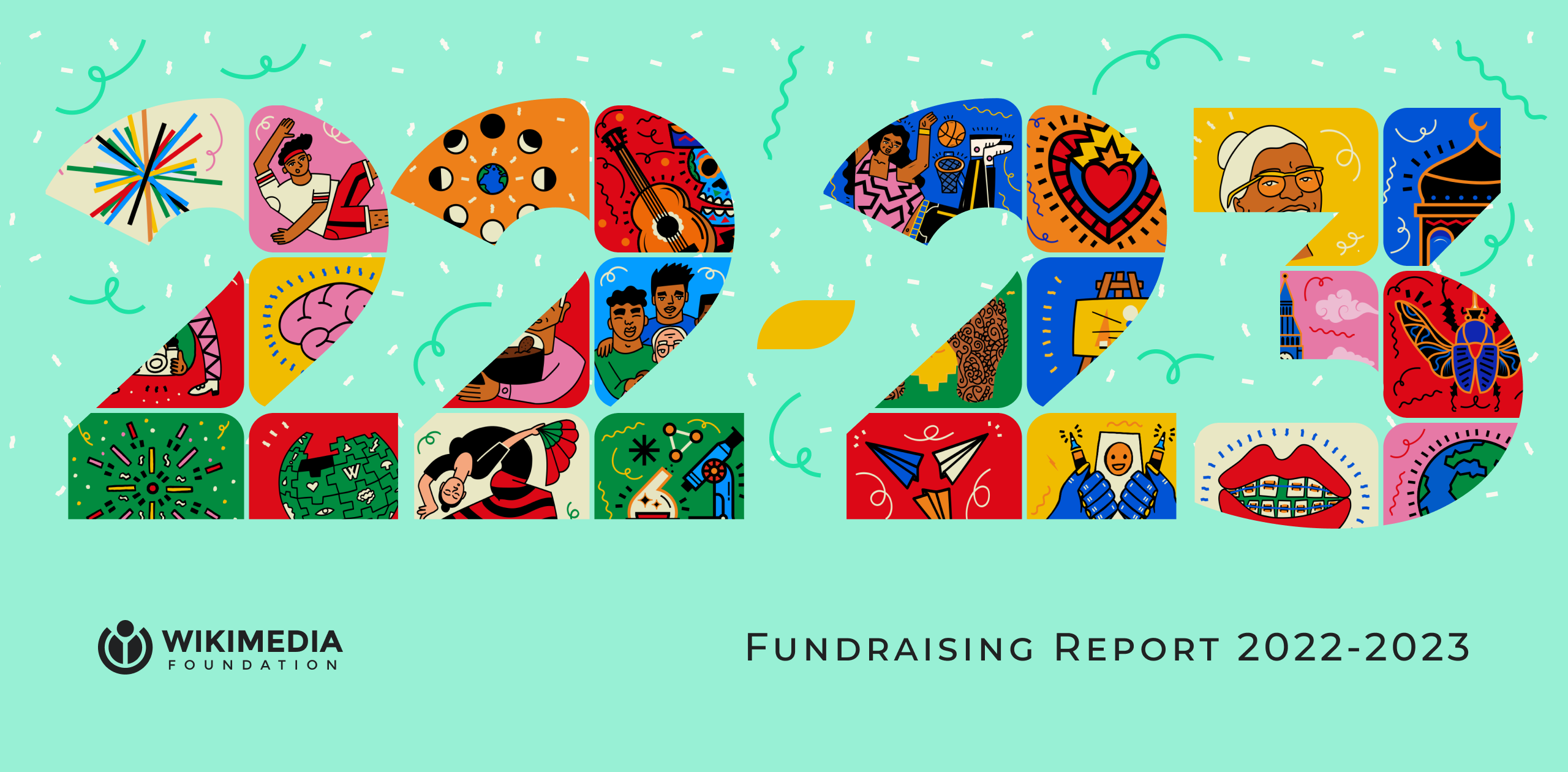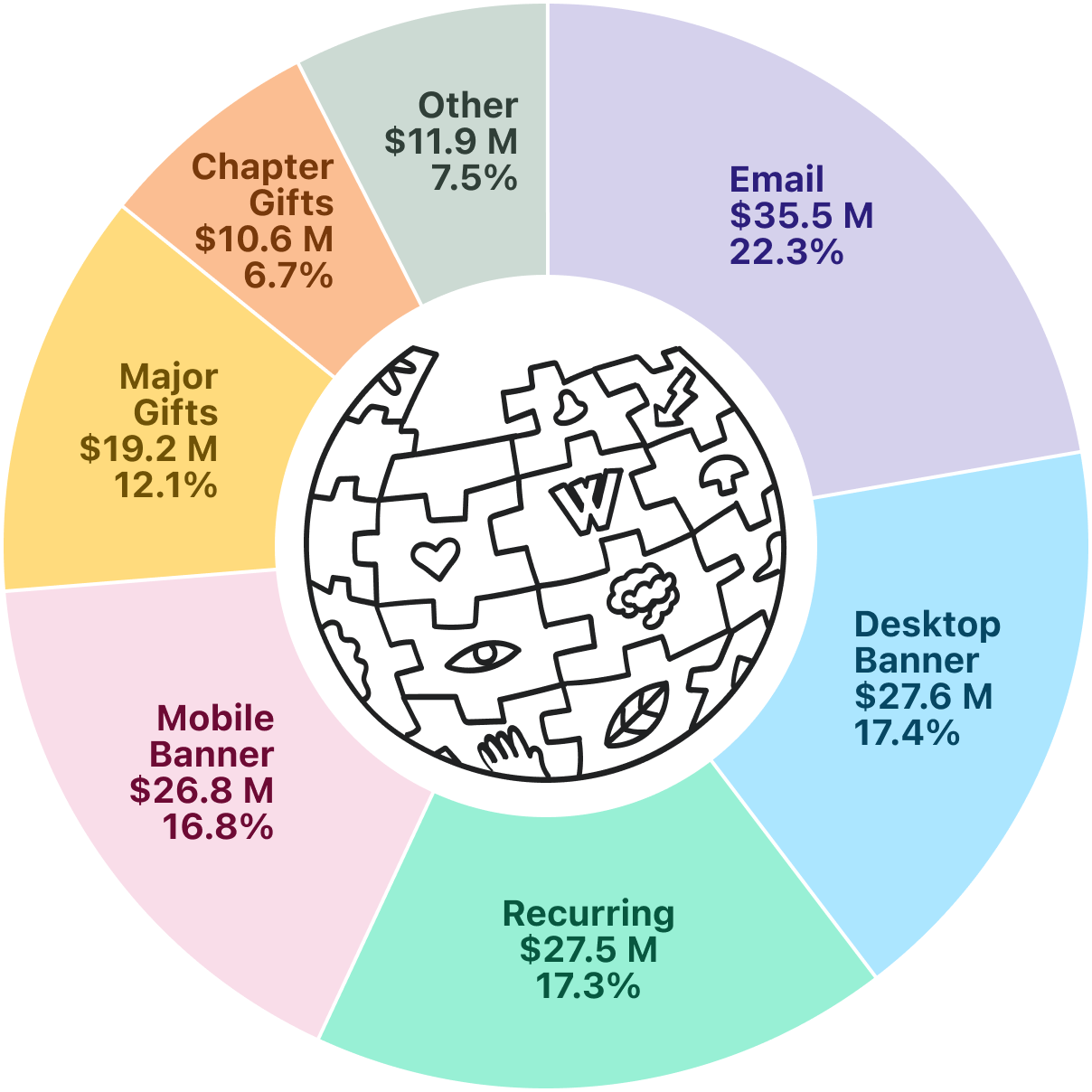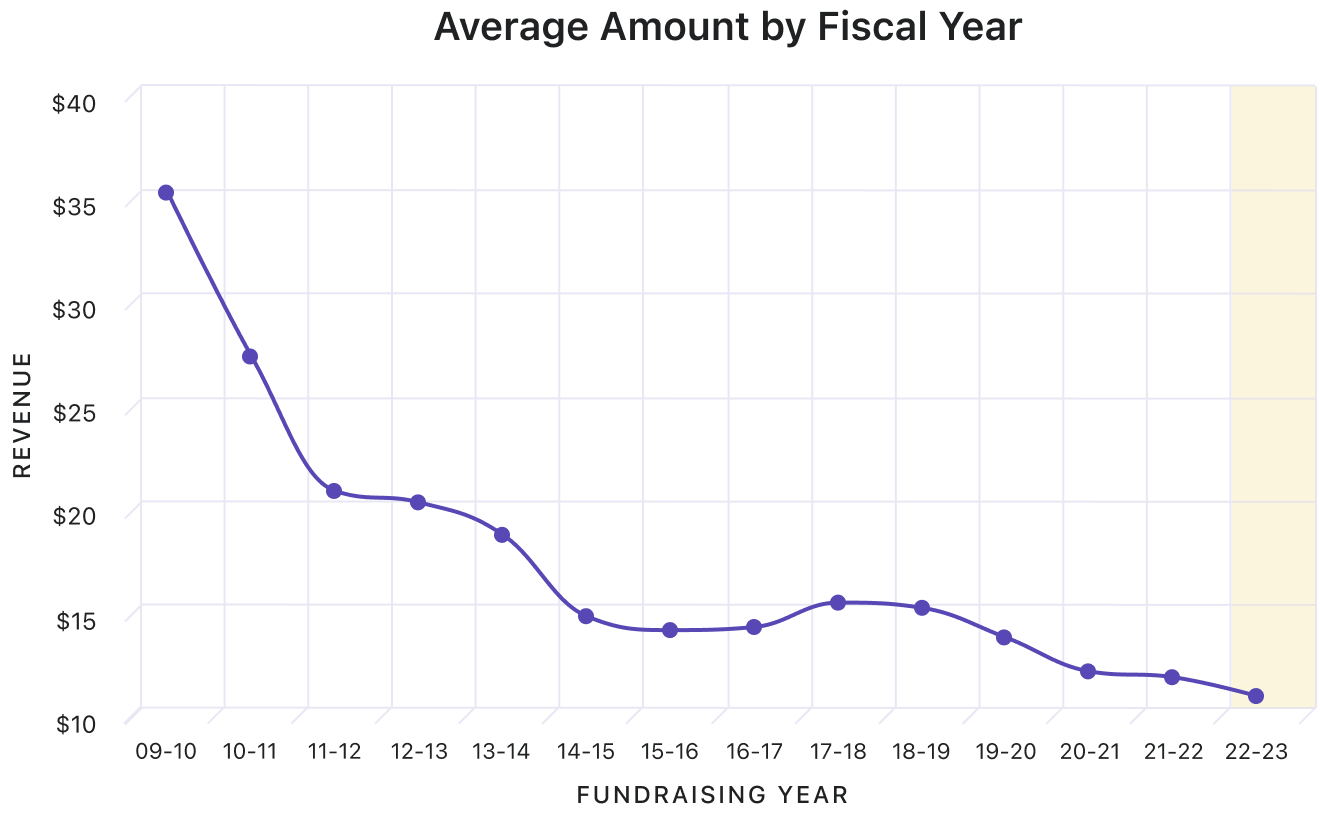Fundraising/2022-23 Report
Introduction
The majority of funding for the Wikimedia Foundation comes from individual donors all around the world. Our fundraising program has a unique model, with over 7.5 million donors giving an average donation of $11.38 in the 2022-2023 fiscal year (FY 22-23) – that’s 7.5 million people engaged in our mission to unlock the world’s knowledge. In FY 22-23, which began July 2022, the Foundation ran campaigns in 36 countries, 25 languages, and received donations from over 200 countries.
These donations allow the Wikimedia Foundation to:
- Support the technical infrastructure of Wikimedia projects, including providing critical services, designing and launching new products to improve user experience, and innovating in areas like machine learning and internet-based collaboration.
- Strengthen performance and effectiveness of the Foundation across its functions.
- Supporting the volunteer communities through grants, programs, training, and other activities.
- Protect Wikimedia projects and communities against growing external threats such as disinformation and harmful government regulation, to ensure they can continue to thrive in the future.
We produce this fundraising report every year to share what we learn from engaging with millions of donors around the world. This is a unique report and, as far as we know, the Wikimedia Foundation is the only major charity to share this type of fundraising information transparently with the public. The Foundation also publishes other reports to inform and engage our community of readers, volunteers, and donors throughout the year. These include our annual report, which focuses on our impact, and our audited financial report that outlines our overall financial activities and financial position.
Collaboration is a pillar of everything we do. This report also explains how the Foundation and Wikimedia volunteers worked together on various fundraising campaigns in FY22-23 and how the team plans to further this collaboration to improve our efforts to support the Wikimedia mission.
Finally, this report highlights how the Wikimedia Foundation’s fundraising program is continuing to diversify streams of revenue to ensure our strategy remains resilient, particularly as we adapt to changing trends in the world around us and take a longer view toward the future.
Key Stats
Donation Totals by Continent
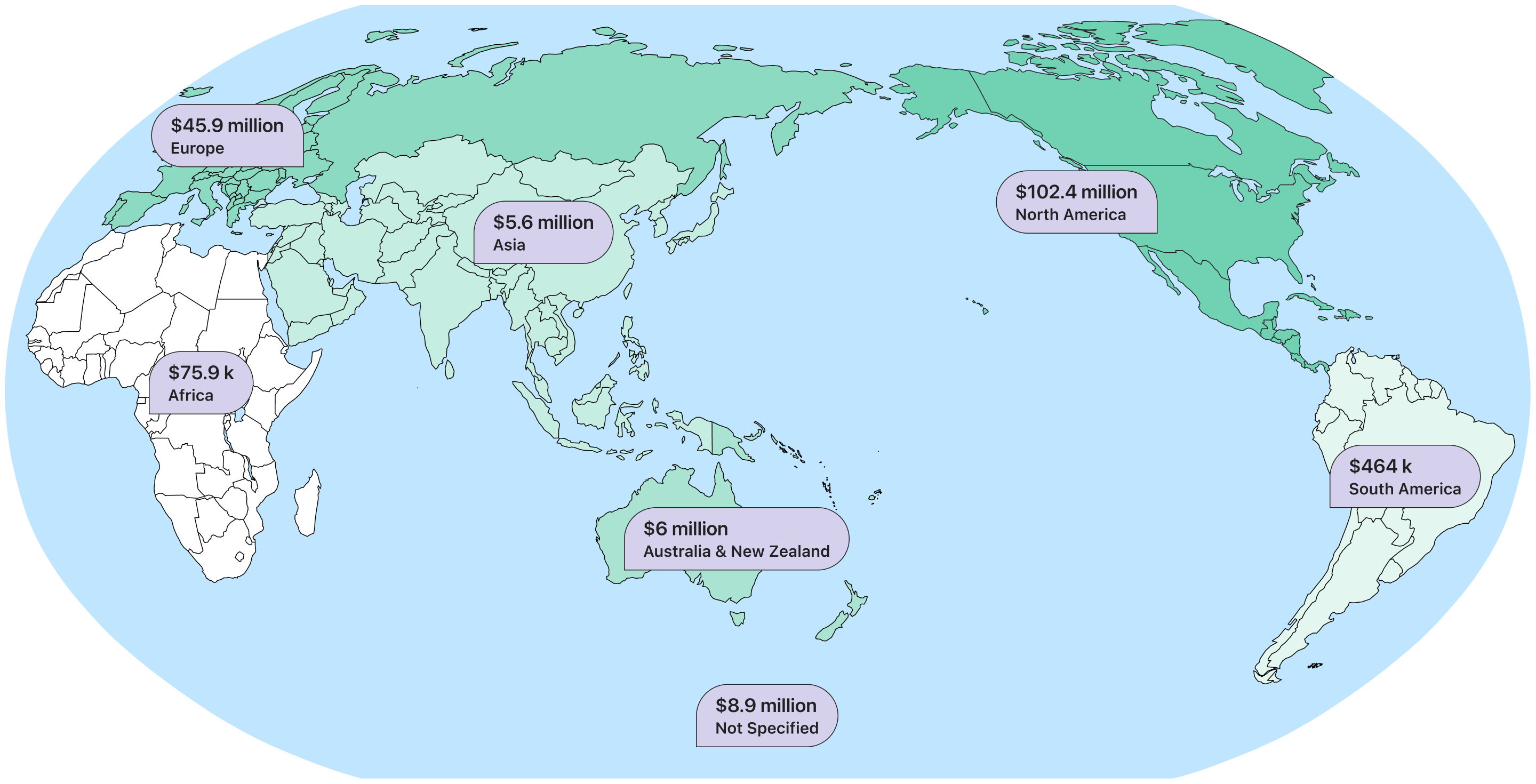
Donation Totals by Sources
$169.6 million USD raised from over 14.9 million donations
Online Fundraising
Banners
The Wikimedia Foundation is primarily funded by individual gifts from readers around the world. Visitors to Wikipedia will sometimes be greeted by a fundraising appeal. These appeals, which we call “banners,” give Wikipedia readers a convenient opportunity to support the Wikimedia Foundation.
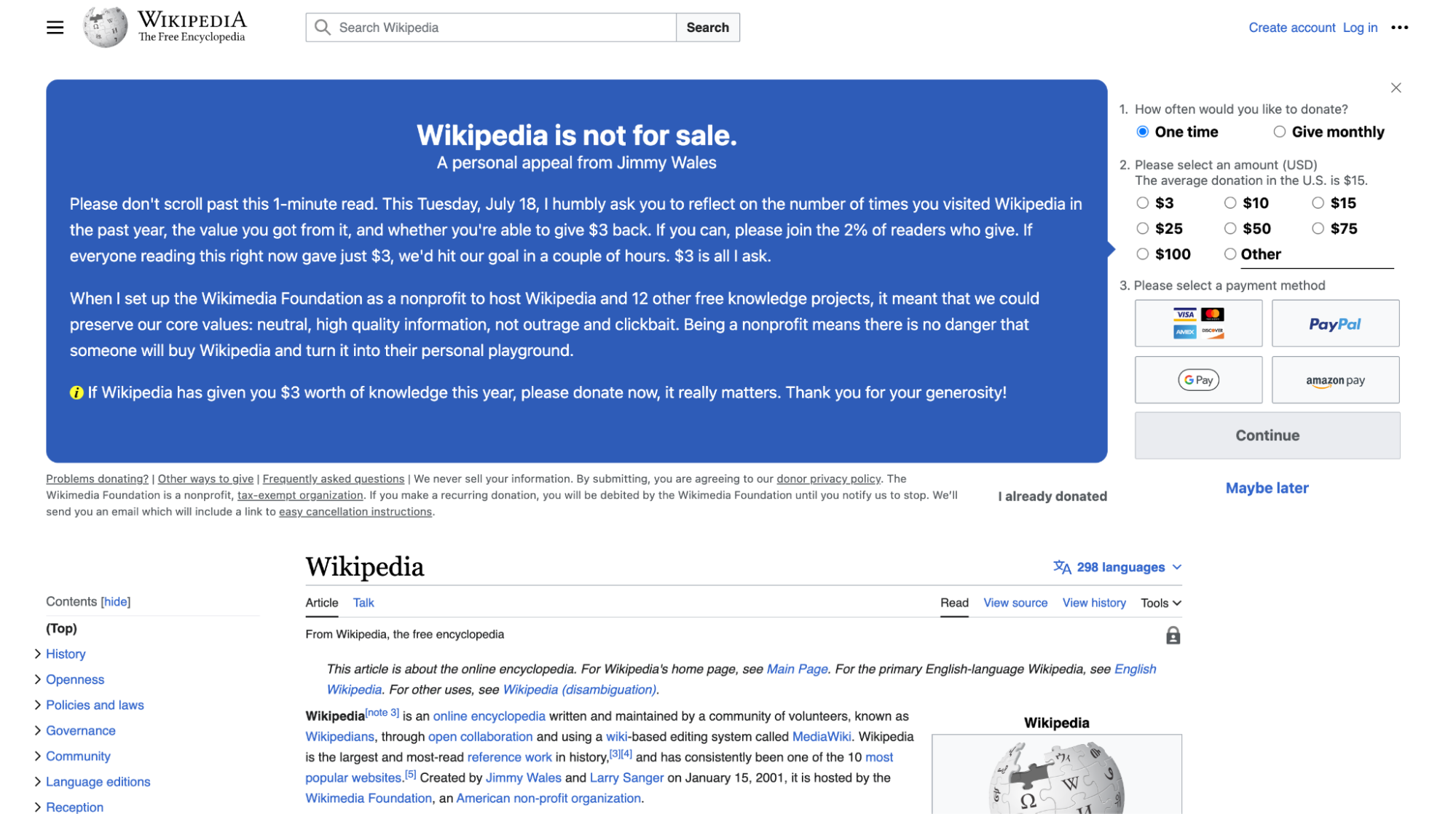
To minimize disruption to the reading experience, the team aims to limit the number of fundraising banners each reader sees, and we make the banners closable. Donors frequently tell us that they enjoy the opportunity to learn more about the Wikimedia Foundation and how Wikipedia is funded through the information in the banners. They are a key educational tool to get the word out about our reader-supported revenue model.
There are trade-offs in how we balance maximizing banner revenue with the impact on readers and volunteers. In a typical campaign, over 75% of donors donate the first or second time they see a fundraising banner. Response declines as readers see more banners.
The 2022 banner campaign on the English Wikipedia used lower-performing wording, and therefore required a longer campaign, more banner impressions, and more emails to past donors; it resulted in a $10 million decrease compared to the 2021 campaign.
Community Collaboration
At the Wikimedia Foundation, collaboration is a pillar of everything we do. In FY 22-23, the Foundation deepened collaboration with Wikimedia volunteers, and we are committed to building on this to improve our fundraising efforts in support of our mission.
Our largest campaign spans six primarily English speaking countries: Australia, Canada, Ireland, the United Kingdom, the United States, and New Zealand. In December 2022, the English Wikipedia community had a request for comment that underscored the importance of the Foundation’s fundraising team working closely with the movement on banner messaging. The team kicked off a collaboration process that resulted in the English banner campaign featuring more than 400 banners that came from the co-creation process with volunteers.
While we gathered many interesting learnings, the revenue performance of the banners declined significantly last year and resulted in a longer campaign, with readers seeing 49% more banners than previous years.
Prior to the 2022 campaign, the team worked to increase the efficiency of the banner campaigns to limit disruption for our readers, by both reducing the length of banner campaigns and limiting the number of banners that readers see. In the year to come, we aim to improve the performance of banners in collaboration with volunteers.
Community collaboration and localization around the world
After the English campaign, the fundraising team continued to collaborate with volunteers on fundraising campaigns in Sweden, Japan, Czech Republic, Brazil, and Mexico. In addition to on-wiki collaboration spaces, the team worked with volunteers from each community on local language wikis, virtual calls, and in other forums.
Collaboration between communities and the Foundation early on in the fundraising process is critical. Each community gave their time to discuss their own unique context and insight, ranging from how to provide a strong local payment experience to the best ways to translate Jimmy Wales’s new message for a local audience.
Our fundraising messaging in the 2023 campaigns primarily focused on the quality of translations and localization. To provide a quality experience to our global readers, it’s important to develop appeals considering linguistic and cultural nuances. We translate our best performing messages from English to 25 languages or modify the messages we use for different cultural contexts. Affiliates often made up a key part of this process – working to provide localization expertise and also bring others to the table. We actively monitor donor and volunteer feedback to develop and adapt messaging. The fundraising team is grateful to everyone who worked together with them on these campaigns, and we look forward to strengthening collaboration in the year to come. If you would like to help translate fundraising messages or participate in localizing the donor experience, please email fr-localization@wikimedia.org to get involved.
Deepening relationships with donors beyond banners
Email is a key communication tool to engage past donors in renewing their support, as well as increasing awareness and understanding of the Foundation and the broader Wikimedia movement. Email has been a growing revenue channel over the past few years as we have built up our base of supporters and developed our email program. Engaging past donors to support our work has been an important part of our fundraising strategy to diversify revenue streams beyond banners on Wikipedia to strengthen the sustainability of the fundraising program.
In FY 22-23 we intentionally focused more on deepening the relationship we have with existing donors. We see donors as much more than people who fund our work; every donor is a vital and potentially lifelong partner in our community. In practice, this involved testing new email thank you campaigns, as well as inviting donors to learn how to edit, discover their local affiliate, attend events, and become monthly supporters.

Email messaging is only sent to donors who have opted-in, and people are able to easily unsubscribe from receiving emails. As part of our commitment to transparency, the team shares banners and emails on Meta and on local language Wikipedias prior to each campaign. The Wikimedia Foundation’s emails consistently perform above industry benchmarks.



Cultivating our Monthly Donor Program
Our recurring fundraising program, where readers make contributions on a monthly basis, continued to grow this fiscal year, demonstrating readers’ interest in providing regular, ongoing support. The vast majority of donations to the Wikimedia Foundation are single, one-time gifts. Developing the monthly recurring program has been a significant focus from the team over the past several years, to boost the Foundation’s long-term sustainability. As part of this, we have increased the ease of becoming a recurring donor and added more options for recurring donors. In FY 22-23, revenue from recurring donations increased 20% this year. The team will continue our efforts to grow this program in the coming years.
The team shared more opportunities for donors to become recurring donors. Email messaging, for example, was particularly successful in recruiting more recurring donors. A key way in which we improve our fundraising program is through disciplined A/B testing. No test is too small; sometimes a word or small design change can make a big difference. For example, in the last year, we tested new language and button placement in emails to past donors highlighting the option of donating monthly. This button change led to enhanced performance for both one-time and recurring gifts.
To recognize donors’ ongoing monthly support and improve their experience during our fundraising campaigns, we proactively reached out to them ahead of the main banner campaign to provide them with the information to disable banners on Wikipedia during our English campaign.

“You make a world where knowledge is free for everyone possible, a remarkable aim that is real dedication and I am endlessly grateful. I regularly - many times a month - consult the articles in Wikipedia, so I think my recurring donation is a v. modest contribution in return to pay for its continuity.”
Donor from Australia
Fundraising Technology and Payments Initiatives
New countries and ways to support Wikimedia
Our resilience as an organization is bolstered when readers around the world can easily join our community of donors. The fundraising team works to improve and expand our payment options in different countries to give as many people as possible around the world the opportunity to support Wikipedia with a convenient and seamless giving experience. We currently support donations through 29 unique payment types in 28 currencies around the world.
This fiscal year, we ran our first banner fundraising campaign in the Czech Republic. The campaign, which was run on Czech Wikipedia, offered multiple payment options and used messaging that was localized in collaboration with the affiliate, Wikimedia Czech Republic. We promoted the affiliate on the thank you page that readers see after they complete their donation as a way of increasing awareness and engagement with the broader mission.
The team added a new option for donors to make monthly recurring donations in more markets. We also made general overall improvements to our payment processing systems, which boosted payment completion rates. For example, in Latin America, we saw a 10-15% increase in donation rates on credit cards due to the optimized single-click donation flows we adopted. By modernizing our payment service connections, we also saw a 15% lift on Pix in Brazil, which is now a dominant payment instrument there. In India, through PayTM and UPI, we gave donors a simple way to become recurring donors.
Advancements in Apps
The Wikipedia Android and iOS apps are used by some of our most loyal readers, and they reach nearly 6 million monthly active users in total. As digital wallets are increasingly becoming the primary way people wish to pay around the world, the team worked on implementing Apple Pay and GPay.
In addition, we have been running fundraising banners on the Wikipedia app in our English campaign countries since 2016. In FY 22-23, we ran our first non-English app banners in Japanese, and we plan to expand to more languages and countries in the near future.
Secure and stable systems
The Wikimedia Foundation is a global leader amongst non-profits in providing donation systems that prioritize the security of reader and donor data and privacy. We’re one of the largest supporters of CiviCRM, an open-source supporter management system. The fundraising technology team securely maintains user and supporter data on secure data centers.
The fundraising team spent time upgrading our connection to our secondary payment processor, thus making it our primary, and migrated our campaigns to this connection. This upgrade enabled us to leverage better tools for recurring donations, fraud prevention, reporting and to experience better overall stability.
Major Gifts and Foundations
Staff working in support of the Major Gifts and Endowment programs build long-term personal relationships with donors with the goal of securing support for Wikimedia’s immediate and long-term needs. Through customized cultivation strategies, impact reports, newsletters, and in-person and virtual meetings and events, we help bring the Foundation’s and the Endowment’s work alive for donors.
In FY22-23, major donors contributed $19.2 million USD to the Foundation. Major donors are people or organizations who give $1,000 USD or more, or who give in other specific ways, such as through donor-advised funds or gifts of stock. About 2,700 people gave gifts of over $1,000 USD, while about 19,000 others contributed through donor-advised funds, payroll deductions, and other donation methods that fall under major gifts. Many donors choose to be recognized on our Benefactors page, which is a public expression of gratitude for those donors who have supported the Wikimedia Foundation.
Gifts from major donors are a key part of the Wikimedia Foundation’s revenue strategy, and we expect our major giving targets to increase in the coming years. The vast majority of major gifts are unrestricted donations to the Foundation’s general operating fund. A small number of purpose-restricted donations were made this year. Restricted donations help donors make a specific impact on our mission and give an opportunity for them to feel a meaningful and transformative connection to our work. Highlights of restricted donations this year include support from the Rockefeller Foundation and Google.org for the development of Abstract Wikipedia.
Matching Gifts
More than 38,000 gifts were made through corporate philanthropic programs this past year. In these matching gifts and payroll deduction programs, employers match employees’ individual gifts to the Wikimedia Foundation, doubling or even tripling the original donation amount. These programs are relatively common at large, US-based companies. These gifts totaled over $1.2 million USD.
Wikimedia Endowment
The Wikimedia Endowment achieved several key milestones this year. These milestones were possible because of steady actions taken throughout the past seven years to strengthen the Wikimedia Endowment’s fundraising, governance, and structure.
In 2016, we launched the Wikimedia Endowment to create a sustainable future for Wikimedia projects and invest in their growth. The Endowment is, first and foremost, an investment fund. That means that donations to the Endowment are invested in financial markets. A portion of the gains from those investments is reinvested to grow the Endowment over time, and a portion of the fund can be used to cover the endowment's operational costs and to provide funding for Wikimedia projects, in accordance with the spending policy.
The purpose of the Wikimedia Endowment is to support the Wikimedia projects in perpetuity. During times of prosperity, the Wikimedia Endowment will serve as a springboard for growth and innovation. During tough economic times, the Endowment will help fund the most critical operations that keep the Wikimedia projects functioning. While the Endowment does not replace our need to raise our annual operating budget, it does strengthen our resilience, and it is a testament to the value that so many people place on the need for knowledge.
Fundraising and Planned Giving
This year, donors gave $14.6 million to the Wikimedia Endowment in a variety of ways — including direct donations, realized bequests from individuals who left gifts to Wikimedia in their wills, and Qualified Charitable Distributions, which are also known as IRA Charitable Rollovers. Throughout the year, about 350 people and institutions made gifts of $1,000 USD or more to the Wikimedia Endowment. This includes $2 million from the Arcadia Fund and a $1 million gift from Amazon. More than 406,000 other donors made gifts to the Wikimedia Endowment, with an average donation of $35.50 USD.
Also during FY 22-23, 655 people made legacy gift commitments, which are an important part of the Endowment’s long-term strategy. Legacy giving is a way of collecting pledges for future donations, most commonly through gifts in wills and beneficiary designations. The Wikimedia Endowment has partnered with FreeWill, a free online tool to create a legal will in the United States, to make it easy for those who wish to make a legacy gift to the Endowment. This year, we realized a few large donations based on previous legacy gift commitments, including a $1 million dollar gift and a $500,000 gift, both from donors whose wish was to remain anonymous.
Many of our Endowment donors choose to be recognized on the Endowment website’s Benefactors page or as members of the Wikipedia Legacy Society.
Establishing the Endowment as an independent charity and grantmaking
In FY22-23, the Wikimedia Endowment began the transition to an independent US 501(c)(3) charity. The Wikimedia Endowment Board and Wikimedia Foundation staff began the process of setting up the Endowment’s strategic and operational policies and systems. The Endowment Board formed three committees (Governance, Grantmaking & Community, and Finance) and approved new policies to direct the operations of the entity. These include the Open Access Policy and the Gift Policy, amongst others. The Endowment’s governing documents and policies are on Governance Wiki. With the necessary policies in place, Foundation staff were then able to undertake operational changes, including insurance and custodial systems, banking, tax and arrangements with external auditors. We also welcomed two new Board members, further strengthening the Endowment's leadership[4].
After meeting the Endowment’s initial goal in the 2021-22 fiscal year, the Endowment board made the decision to start providing funding to support the Wikimedia projects this fiscal year. We conducted interviews with people who donated to the Wikimedia Endowment and asked them what the Endowment should support in the near future. The theme that emerged from these conversations was a focus on funding technical innovation, so that the Wikimedia projects stay relevant in a time of rapid technological change. The board then launched a funding strategy to support the technical innovation of the Wikimedia projects. Led by the Community and Grantmaking Committee, the full Board approved the first grants out of the Endowment, totalling $3.2 million. You can learn more about the projects that the Wikimedia Endowment supported this year on Diff, including Abstract Wikipedia and Wikifunctions, Kiwix, Machine Learning, and Wikidata. In September 2023, we published an additional update about the Endowment on Diff.
An updated FAQ about the Endowment is on Meta.
From Our Supporters
During the 2022-23 fiscal year, the Donor Relations team responded to 183,000 donor and supporter inquiries from 120 countries in 37 languages. A portion of these supporters reached out to us to express their gratitude for Wikipedia, tell us more about why they decided to support our mission, and suggest ways we could improve in the future. We are glad to share some of their comments below:
France: "Universal knowledge within everyone's reach is the only effective weapon for winning peace in the world and preserving or freeing people from all dictatorships. Wikipedia is in this respect a major vector by its neutrality, its convenience of access and the real quality of all its articles which nourish the lights and the philosophical reflection. Thank you and long may it live."
Original in French: "La connaissance universelle à la portée de tous est la seule arme efficace pour gagner la paix dans le monde et préserver ou affranchir les peuples de toutes les dictatures. Wikipedia en est à ce titre un vecteur majeur par sa neutralité, sa commodité d'accès et la réelle qualité de tous ses articles qui nourrissent les lumières et la réflexion philosophique. Merci et longue vie."
Mexico: "Causes like Wikimedia make a fairer world, in which more people have access to information that was previously intentionally or circumstantially limited. The evolution of communications and technology are shortening social gaps, and making freedom and liberation more viable for those who, unfortunately, suffer from dictatorship and exploitation. GOD BLESS WIKIMEDIA, and any similar project that provides access to information. God bless each and every one of your collaborators always."
Original in Spanish: "Las causas como Wikimedia, hacen un mundo más justo, en el que más personas tienen acceso a información que antes les era limitada intencional o circunstancialmente. La evolución de las comunicaciones y la tecnología están acortando las brechas sociales, y haciendo más viable la libertad y la liberación de quienes, desafortunadamente, padecen dictadura y explotación. DIOS BENDIGA WIKIMEDIA, y todo proyecto similar que brinde acceso a la información. Dios les bendiga siempre a todos y cada uno de sus colaboradores."
UK: "For someone that grew up in the Seventies and remembers well a pre-internet world, I am still in a state of wonder at this extraordinary technology. And such a myriad of information at the mere tap of a screen. Thank you Wikipedia."
Italy: "You are the greatest thing that exists on the web. Thank you for enriching knowledge to billions of people."
Original in Italian: "siete la cosa più bella che esiste nel web. Grazie a voi di aver arricchito la conoscenza a miliardi di persone."
Brazil: "Let us hope that the construction of Wikipedia goes on forever along with human evolution. Believe you or not but I always think that a backup of Wikipedia should be taken from time to time and stored somewhere out of Earth, in case of a new world war or any other type of destructive event happens."
Sent in English
Ireland: "Wikipedia is a truly excellent production. I have learned so much from it. It must go on for the good of the world, the people and the quest to spread knowledge and eradicate ignorance forever. I just wished I had Wikipedia 30-40 years ago."
Netherlands: "Thank you for being one of the most influential world changing forces humanity has seen."
Sent in English
US: "In an age of disinformation and commercialized everything, Wikipedia is nothing short of a miracle. You give me information but you also give me hope."
Spain: "Thank you for your great work. I come from a generation in which "general culture" was essential for our daily lives. My father taught me that you should always find the answer to everything, that you should never say "I don't know" to a child. My children call me "Wikimami". And when I don't know, I come to you."
Original in Spanish: "Gracias a vosotros por vuestra gran labor. Decir que vengo de una generación en la que la "cultura general" era imprescindible para nuestro día a día. Mi padre me enseñó que siempre se debía encontrar la respuesta para todo, que nunca debías decir a un niño "no lo se". Mis hijos me llaman "Wikimami". Y cuando no lo se, acudo a vosotros."
UK: "In his book "Unended Quest" the ageing Karl Popper, professor of philosophy and advocate of objective knowledge, wrote of the possibility that all the knowledge in the world could exist independently of the thinkers who created it, indeed even in the absence of the human race, for instance after an extinction event. This was in 1976, way before the internet. Wikipedia is conceptually simple but in its executed form quite a stunning source of knowledge for all the world to share - and indeed any other intellect which might gain access to it!"
Canada: "Please know how much Wikipedia's unique importance and unrivalled value become ever more urgent in a world in which the privatization and contamination of knowledge are proceeding apace. Thank you and your colleagues for doing so much to keep the lights on for all people in a darkening house. You truly are culture heroes, and I hold a good thought for all of you who are sustaining Wikipedia."
Australia: "Wikipedia has my sincere respect. Knowledge and education are one of the most democratic, effective and important tools of inclusion and social justice in the world. More power to you for keeping it open access without cost, that is a credit to your values and vision."
India: "Thanks for all the work you guys have done. I wanted to support the Wikimedia Foundation with a portion of my first income for all the help I have received from Wikipedia over the years with school and otherwise. Thanks for this initiative and for helping me with all my school assignments."
Report Talk Page
Thank you for reading our annual fundraising report. Please visit the talk page for any questions or to leave comments about the report. We are happy to share information about fundraising at the Wikimedia Foundation and look forward to your feedback. We will respond to comments and questions to the best of our ability.
- ↑ “Other” may include donations from the Wikipedia sidebar, Wikimedia Foundation “Ways to Give” page, Wikipedia app, portal banners, social media platforms, and also some checks, anonymous, spontaneous (e.g., visiting donate.wikimedia.org directly), and offline donations.
- ↑ “Chapter Gifts” refer to money raised by the two Chapters that currently run their own banner fundraising campaign, Wikimedia Deutschland and Wikimedia Switzerland. Donations received through their fundraising campaigns are transferred to the Wikimedia Foundation in order to support the wider movement.
- ↑ The amounts listed in this fundraising report do not conform to the US Generally Accepted Accounting Principles and differ from revenue reported in our Independent Auditors’ Report and Internal Revenue Service Form 990 Tax Return. This report reflects the value of gifts at the point the donation was made. Many currencies in the world significantly decreased in value relative to the U.S. dollar in 2022 and this may also lead to differences in the value of assets listed in our Independent Audit report and form 990. Lastly, the figures represented from prior years may exclude canceled donations.
- ↑ In FY22-23, the Endowment reimbursed $420,177 to the Wikimedia Foundation for payment processing fees related to contribution transactions.

